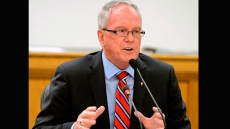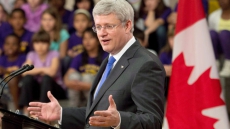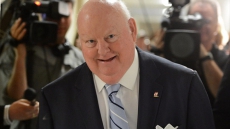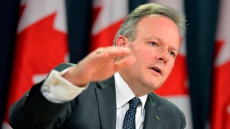VANCOUVER — Major Mark Campbell was lying in a hospital bed, just starting to comprehend losing both his legs above the knees in a Taliban ambush, when he found out the federal government had stripped his lifetime military pension.
"I expected to just move off into the twilight and retire, but unfortunately it's just like the clichè out of a Hollywood movie," said the Edmonton man, describing the conclusion to 33-years of service after a final tour in Afghanistan.
"I come home and I find that, honestly, the biggest battle I've ever faced in my entire life is here at home against my very own government."
Campbell, 49, is one of seven plaintiffs attempting to sue the federal government for drastic alterations to the Canadian Forces compensation regime, which applies to the newer generation of armed forces members injured in the line of service after 2006.
Federal government lawyers were in British Columbia's highest court on Wednesday, launching their appeal of a lower court's approval of a class-action lawsuit in September 2013 by the soldiers disabled in Afghanistan.
The Attorney General of Canada wants the legal action tossed out, even as the veterans join a growing clamour surrounding claims of unfair treatment of retired military personnel across the country.
Campbell, who also lost a testicle, ruptured his eardrum and suffers from post-traumatic stress disorder, said he has been stripped of benefits amounting to about $35,000 — a plight he would have avoided if not for accepting a second call to duty in Afghanistan. His lower body was decimated by the blast of an improvised explosive device while his team rescued another injured Canadian.
He flew to Vancouver to watch the two-day court proceedings that he considers to be the government's attempt to save dollars "on the backs of current-day veterans." He guessed it could take 10 years to see the case finished.
"Canada bred us as warriors. To think that we're just going to fold and buckle under a bit of government pressure is ridiculous," he said outside court. "We're going to fight this thing to the bitter end."
The lawsuit was filed in fall 2012 by the group that claims the New Veterans Charter is unconstitutional and violates the Charter of Rights and Freedoms. It was approved by a unanimous vote of Parliament in 2006 and amended in 2011 as a result of public outcry.
Current and former Canadian Forces members are appalled that the lifetime disability pension for disabled soldiers has been replaced by lump-sum payments.
Inside court, government lawyer Paul Vickery told a three-judge panel the appeal was necessary because the soldiers' claims could negatively impact fundamental democratic principles.
He told court that while the government readily acknowledges the great value and sacrifice of the soldiers, Parliament is the "only appropriate forum" for resolving the claims made in the lawsuit.
"The appeal which the attorney general brings before you is not brought out of any lack of appreciation of those services," Vickery said.
A second federal lawyer then attacked the plaintiffs' main argument that they deserve benefits in line with the previous regime, the Pension Act, based on historical promises. He did not dispute that the new scheme is "less generous."
Travis Henderson contested that repeated pledges by governments over the 20th century, stemming from a speech made in 1917 by then-prime minister Robert Borden, amounted to a special legal obligation to care for soldiers.
He said that while the vow of a "social covenant" suggests a duty is owed based on the "honour of the Crown," it is a legal principle that only applies in the context of aboriginal law.
"I would submit to this court that in no way can a political speech be equated to written constitutional principles," he added.
Veterans Affairs Minister Julian Fantino wouldn't provide comment, but a spokeswoman said the case "deals with something that all parties agreed to under the previous government."
A ruling by the panel can still be appealed to the Supreme Court of Canada before any of its claims are tested in court.





